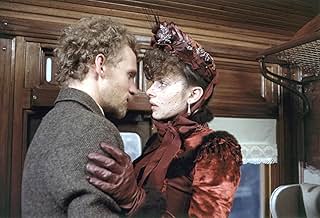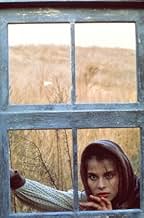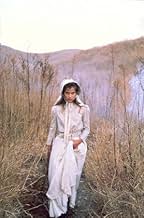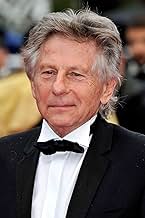Tess
- 1979
- Tous publics
- 2h 50min
NOTE IMDb
7,3/10
19 k
MA NOTE
Une jeune paysanne décidée devient l'objet de la convoitise de deux hommes.Une jeune paysanne décidée devient l'objet de la convoitise de deux hommes.Une jeune paysanne décidée devient l'objet de la convoitise de deux hommes.
- Réalisation
- Scénario
- Casting principal
- Récompensé par 3 Oscars
- 16 victoires et 17 nominations au total
Nastassja Kinski
- Tess
- (as Nastassia Kinski)
Avis à la une
Roman Polanski's film Tess, (1979) adaptation of Thomas Hardy famous novel of the 19th century "Tess of the D'Urbervilles" , won many prestigious awards, including three Oscars of six nominations and every award for Best Cinematography it was nominated for. If any film deserves recognition for its beautiful, lyrical, sensual yet melancholic and poetic visual presentation, "Tess" is it. The movie might be Roman Polanski's finest achievement, and this statement comes from a viewer who is in love with all Polanski's films starting with his debut "Knife in the Water". "Tess" is one of the best adaptations of the classic novel I've seen and it lives, breathes and moves freely. It never rushes to tell its long story but tells it with rare finesse, compassion, and love for the heroine, a gentle creature who had been insulted, humiliated, and ultimately destroyed.
The success of the movie starts with the choice of the actress for the title role. Tess as played by 20 years old Nasstassia Kisnki is beautiful, sensual, shy and full of life and hope for love. The life of Tess unfolds in front of us from her teenage years as an innocent country girl until the powerfully tragic final scene at the magnificent Stonehenge. The film is almost three hours long but I never was bored, on the contrary, I felt compassion for the girl and anger toward the men that used and corrupted her, ruined her hopes for love and happiness, and toward the society that mercifully discarded of her. Tess is one of the best movies I've seen. It is stunning, subtle, emotional, tragic, and unforgettable.
The success of the movie starts with the choice of the actress for the title role. Tess as played by 20 years old Nasstassia Kisnki is beautiful, sensual, shy and full of life and hope for love. The life of Tess unfolds in front of us from her teenage years as an innocent country girl until the powerfully tragic final scene at the magnificent Stonehenge. The film is almost three hours long but I never was bored, on the contrary, I felt compassion for the girl and anger toward the men that used and corrupted her, ruined her hopes for love and happiness, and toward the society that mercifully discarded of her. Tess is one of the best movies I've seen. It is stunning, subtle, emotional, tragic, and unforgettable.
This film was an almost exact replication of Thomas Hardy's novel "Tess of the d'Urbervilles". It's so rare to watch a film after reading the novel and not be disappointed by it, but this film didn't disappoint in any way.
Details, such as the whiteness of the maids' dresses, the sound of milk squirting into a bucket, the sloshing mud of a wet English turnip field, and the glint of adoration in the eyes of the young lovers -- all came gloriously to life as if fresh off the pages of the book.
I highly recommend this film for anyone who enjoys a good old fashioned Victorian love story.
Details, such as the whiteness of the maids' dresses, the sound of milk squirting into a bucket, the sloshing mud of a wet English turnip field, and the glint of adoration in the eyes of the young lovers -- all came gloriously to life as if fresh off the pages of the book.
I highly recommend this film for anyone who enjoys a good old fashioned Victorian love story.
Considering that the cultures of nineteenth century Europe were supposedly so rigidly moralist, it is perhaps surprising that many of the great novels from that era are themselves attacks upon the rigidity. Or perhaps that is only the ones we remember, the ones that have survived as classics. After all, it is easier for a contemporary reader to imagine being stifled by or fighting against such strict order than to be comfortable and complicit in it. And these are the novels that have made the most powerful and enduring adaptations to our contemporary medium of cinema.
Surely the most outstanding thing about this adaptation of Thomas Hardy's Tess of the d'Urbervilles is its magnificent appearance. The cinematography or Geoffrey Unsworth and Ghislain Cloquet is breathtakingly beautiful, at times referencing various paintings of rural England, with some incredibly natural looking twilight scenes. The art direction and costume design is fabulous too, echoing the tones and textures of the countryside. The design follows such a tight colour scheme, beginning with a motley of off-whites, giving way to greys and browns in the latter half of the picture, and finally a deep crimson. And yet it all looks so natural and unforced.
Director Roman Polanski makes this a rich canvas for his camera. As usual his emphasis is upon confinement, often framing people so the tops of heads are cut off, making the image look short rather than wide. And yet this is a picture very much of the outdoors. Polanski shoots the interiors with briefer shots, more frequent camera moves and many close-ups, and as such the indoor spaces seem the most transient and indistinct, which really helps us get a sense of Tess's feeling of not belonging. Throughout the picture the director encourages slowness, stillness and long takes for key scenes, which brings out the best in the acting performances.
German-born Nastassja Kinski at first seems like an odd choice to play the titular Dorset lass. Her attempt at the accent is a bit wobbly at best (although still impressive considering she is not even English), but really her performance is about more than that. She has that peculiar quiet delicacy that the character requires, and just below the surface of her performance lurk all those suppressed emotions, just visible enough that we believe her final actions. The only other standout is Peter Firth. It works very well the way he appears so mature and manly in his earliest appearances, and then when his feelings towards Tess change, he becomes like a spoiled child. Above all, both performances are calm and subdued.
And subdued calmness is what really marks this movie. Voices are barely distinct. The Philip Sarde music score, containing just a hint of Elgar and Vaughn Williams, is as rich and beautiful as the imagery. It is this non-verbal eloquence that prevents Tess from becoming dull or stilted. The adaptation barely communicates directly with its audience, with no explanatory narration and overt exposition. We are left to infer much, such as the baby which suddenly appears without us even having been aware of the pregnancy. The picture has all the subtlety of a good silent movie, giving us its thoughts and feelings through the purity of its images, and as such very much removed from the word-based format of a novel. And yet Tess retains all the power and meaning as a piece of storytelling.
Surely the most outstanding thing about this adaptation of Thomas Hardy's Tess of the d'Urbervilles is its magnificent appearance. The cinematography or Geoffrey Unsworth and Ghislain Cloquet is breathtakingly beautiful, at times referencing various paintings of rural England, with some incredibly natural looking twilight scenes. The art direction and costume design is fabulous too, echoing the tones and textures of the countryside. The design follows such a tight colour scheme, beginning with a motley of off-whites, giving way to greys and browns in the latter half of the picture, and finally a deep crimson. And yet it all looks so natural and unforced.
Director Roman Polanski makes this a rich canvas for his camera. As usual his emphasis is upon confinement, often framing people so the tops of heads are cut off, making the image look short rather than wide. And yet this is a picture very much of the outdoors. Polanski shoots the interiors with briefer shots, more frequent camera moves and many close-ups, and as such the indoor spaces seem the most transient and indistinct, which really helps us get a sense of Tess's feeling of not belonging. Throughout the picture the director encourages slowness, stillness and long takes for key scenes, which brings out the best in the acting performances.
German-born Nastassja Kinski at first seems like an odd choice to play the titular Dorset lass. Her attempt at the accent is a bit wobbly at best (although still impressive considering she is not even English), but really her performance is about more than that. She has that peculiar quiet delicacy that the character requires, and just below the surface of her performance lurk all those suppressed emotions, just visible enough that we believe her final actions. The only other standout is Peter Firth. It works very well the way he appears so mature and manly in his earliest appearances, and then when his feelings towards Tess change, he becomes like a spoiled child. Above all, both performances are calm and subdued.
And subdued calmness is what really marks this movie. Voices are barely distinct. The Philip Sarde music score, containing just a hint of Elgar and Vaughn Williams, is as rich and beautiful as the imagery. It is this non-verbal eloquence that prevents Tess from becoming dull or stilted. The adaptation barely communicates directly with its audience, with no explanatory narration and overt exposition. We are left to infer much, such as the baby which suddenly appears without us even having been aware of the pregnancy. The picture has all the subtlety of a good silent movie, giving us its thoughts and feelings through the purity of its images, and as such very much removed from the word-based format of a novel. And yet Tess retains all the power and meaning as a piece of storytelling.
Polanski's 'Tess' is rich with images and poetry. To start with, the director really does make use of the countryside and life in the country during the late 1800s. Those themes are presented as characters themselves. And, coupled with the fitting score it gives a feel of what the time may have been like. Along with some fine cinematography, many of the shots linger on the beautiful and yet sad countryside.
The pacing is exceptionally well maintained. 'Tess' is longer than the traditional 100 minute flick but not for a moment does it feel as though it's lagging or dragging in pace.
Another strength of the film is its subtlety. For example, to the director's credit, there's an outstanding sequence of how murder is implied just with a few drops of blood. Even the finally sequence (beautifully done) implies Tess's fate (before the epilogue clarifies it). 'Tess' touches on some heavy themes such as sexism, poverty and betrayal but it doesn't preach about them. Rather it tells the story of a strong-willed, devoted and kind woman who was faulted for being beautiful.
Moreover, the characters are brilliantly layered. The screenplay has safely avoided caricatures). A very young Nastassja Kinski is incredible in one of her early roles. Her restrained performance and gestural expressions are remarkable. Peter Firth does a fine job too. They are supported by very good performers.
This is easily one of Polanski's finest: his most subtle and poetic films. A treat to watch.
The pacing is exceptionally well maintained. 'Tess' is longer than the traditional 100 minute flick but not for a moment does it feel as though it's lagging or dragging in pace.
Another strength of the film is its subtlety. For example, to the director's credit, there's an outstanding sequence of how murder is implied just with a few drops of blood. Even the finally sequence (beautifully done) implies Tess's fate (before the epilogue clarifies it). 'Tess' touches on some heavy themes such as sexism, poverty and betrayal but it doesn't preach about them. Rather it tells the story of a strong-willed, devoted and kind woman who was faulted for being beautiful.
Moreover, the characters are brilliantly layered. The screenplay has safely avoided caricatures). A very young Nastassja Kinski is incredible in one of her early roles. Her restrained performance and gestural expressions are remarkable. Peter Firth does a fine job too. They are supported by very good performers.
This is easily one of Polanski's finest: his most subtle and poetic films. A treat to watch.
Tess had a lot going for it, a wonderful book and a director that was responsible for masterpieces like Chinatown, Repulsion and Rosemary's Baby. Tess didn't quite live up to the promising potential it did have and I don't consider it one of Polanski's masterpieces. However it is a commendable film and adaptation(even if I do prefer the 2008 BBC series) and better on re-watch than when I saw it a couple of years back and didn't care at all for it. The film is overlong, and while the pace is purposeful considering the book's complexity there are times where it does get a bit too languid. On the other hand, visually it is stunning with evocative scenery and photography. The music is also resolutely haunting, the scripting thought-provoking and literate and the story having its necessary pathos as well as being devastating and powerful in equal measure. The denouncement with Stonehenge as the backdrop is just stunning. The characters are not as complex as in the book or the series but are still interesting and emphatic. Nastassja Kinski does have moments where she is a little flat, but on the whole it is a very moving performance. Peter Firth is suitably subtle as Angel Clare and Leigh Lawson's menacing Alec comes close to stealing the film. Polanski's direction is exemplary. All in all, has much to admire but falls flat of being a truly outstanding movie. 7/10 Bethany Cox
Le saviez-vous
- AnecdotesThe film's opening dedication at the start of the film states: "For Sharon". Roman Polanski dedicated this movie to his late wife, Sharon Tate, who was killed in 1969 by the Manson Clan. Before Tate's death, she had read the film's source novel by Thomas Hardy and was convinced that her husband would one day make a great film based on the novel, with the hope that she would star in it. Movie was released to the theaters exactly 10 years after her untimely death.
- GaffesAt the beginning of the final sequence, set at Stonehenge, someone's head can be seen at bottom-left.
- Versions alternativesThe film was first released to German cinemas uncut with a running time of 184 minutes. As the audience reaction was far from overwhelming the distributor decided to re-cut and re-release the film in a more "accessible" 134 minutes version. But at least one of the original prints had survived and was shown here at the local art house years later.
- ConnexionsFeatured in The 38th Annual Golden Globe Awards (1981)
Meilleurs choix
Connectez-vous pour évaluer et suivre la liste de favoris afin de recevoir des recommandations personnalisées
- How long is Tess?Alimenté par Alexa
Détails
- Date de sortie
- Pays d’origine
- Langue
- Aussi connu sous le nom de
- Cô Gái Đức Hạnh
- Lieux de tournage
- Sociétés de production
- Voir plus de crédits d'entreprise sur IMDbPro
Box-office
- Budget
- 12 000 000 $US (estimé)
- Montant brut aux États-Unis et au Canada
- 20 093 330 $US
- Montant brut mondial
- 20 101 247 $US
- Durée
- 2h 50min(170 min)
- Couleur
- Rapport de forme
- 2.35 : 1
Contribuer à cette page
Suggérer une modification ou ajouter du contenu manquant






















